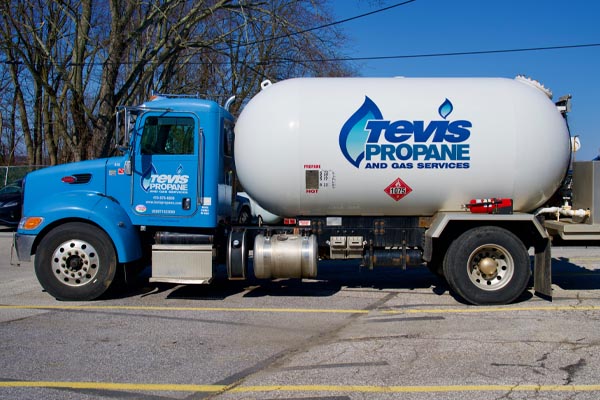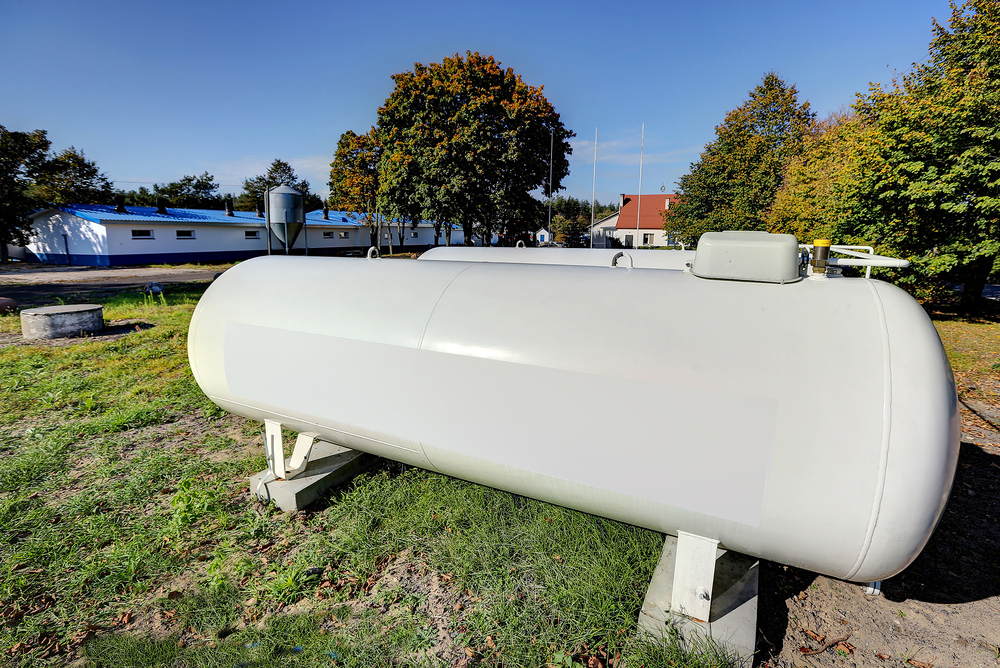Propane, an essential, colorless, and odorless gas, is crucial in our everyday lives, supporting tasks from heating our homes and cooking food to fueling our grilling and camping adventures. Its adaptability and efficiency are why it’s favored globally. Yet, its storage and performance can be greatly affected by conditions like the intense heat of summer.
This article by Tevis Energy explores propane’s diverse uses and investigates how summer’s high temperatures can impact propane’s storage, stability, and functionality. Grasping these impacts is vital for both consumers and industries dependent on propane, helping us to manage potential hazards better and maintain the consistent effectiveness of this indispensable energy source. Keep reading to explore propane summer heat.
Understanding Propane & its Properties
Propane, classified as a liquefied petroleum gas (LPG) with a chemical formula of C3H8, is highly flammable and possesses a distinct odor to aid in leak detection. Its ability to burn cleanly has made it a favored choice for residential heating and cooking, providing efficient energy output and accurate temperature management.
However, given its flammable nature, adhering to safe handling and storage procedures is essential. Ensuring proper ventilation and regular maintenance of propane tanks is critical to avoid accidents. Familiarity with these safety measures is key to reducing risks related to propane use.
Effects of High Temperatures on Propane Behavior

The behavior of propane is notably influenced by high summer temperatures, primarily because of its heat sensitivity. Propane remains liquid under pressure within storage tanks and has a boiling point of around -44 degrees Fahrenheit or -42 degrees Celsius.
During the warmer months, exposure to elevated temperatures causes the liquid propane in the tanks to vaporize and expand.
Elevated temperatures lead to the vaporization and expansion of liquid propane molecules, which increases pressure inside the tanks and raises the risk of over-pressurization that might result in leaks or ruptures. Heatwaves, particularly when combined with direct sunlight or inadequate ventilation, intensify this danger by speeding up vaporization and the subsequent pressure increase.
Adopting safety protocols such as routine inspections, ensuring proper ventilation, and storing tanks in shaded areas is essential to reduce these risks, guaranteeing safe propane storage and use even during the hot summer months.
Need a refill? Rely on Tevis Energy for quick and easy propane delivery when you need it. Contact us today!
Safety Concerns & Precautions for Propane Tanks
Ensuring proper ventilation and temperature management for propane tank storage is crucial for safety, as it helps disperse heat and avert pressure buildup.
Tanks must be situated in well-ventilated areas, shielded from direct sunlight, and distant from heat sources, particularly during warmer climates. It is important to conduct regular checks for any damage and monitor temperatures closely.
Swiftly address leaks or unusual odors and adhere to emergency procedures if necessary. By emphasizing these safety practices, homeowners can effectively minimize the risks associated with propane tanks in warm weather.
Preventive Maintenance & Inspection of Propane Tanks

Preventive maintenance and inspections on propane tanks are vital to maintain safety and efficiency. Here are some guidelines to follow:
- Routine Propane Tank Inspection: It is important to regularly inspect propane tanks and their related equipment to guarantee they are functioning correctly and safely.
- Assess for Propane Tank Corrosion & Damage: Continually inspect your propane tanks for signs of corrosion, damage, or wear that might undermine their structural integrity and pose safety hazards. Address issues like rust, dents, or leaks immediately to mitigate potential risks.
- Recommended Maintenance Schedules: Set up a maintenance schedule for your propane tank systems that includes checking pressures, testing safety mechanisms, and verifying valve functionality.
- Proper Propane Tank Storage: Adhere to correct handling and storage guidelines to lower the risk of accidents or leaks from propane.
- Consultation with Tevis Energy: For thorough inspections and maintenance of propane tanks, consulting with professionals like Tevis Energy is recommended. Their expertise ensures compliance with industry standards and boosts the safety and durability of your propane tank systems.
Don’t be caught without fuel! Contact Tevis Energy today for timely propane delivery right to your door. Call now!
Environmental Impact & Regulatory Compliance
It’s essential to follow regulatory standards and best practices in propane storage and handling to mitigate risks associated with summer heat and ensure safety. Complying with these regulations protects the environment and ensures responsible use of propane resources.
Furthermore, innovations in tank design and the introduction of environmentally friendly propane solutions enhance both safety and sustainability within the industry.
By adopting these advancements and maintaining compliance with regulatory requirements, stakeholders can minimize environmental impacts and promote the efficient and responsible use of propane.
Summer Propane Tips FAQs

As we tackle the challenges of managing propane in the intense heat of summer, understanding key concerns and safety measures is essential. Here are some frequently asked questions (FAQs) to assist you in maintaining safe and efficient propane usage throughout this season:
How Does High Summer Heat Affect Propane in Tanks?
In the peak of summer, propane within tanks can vaporize and expand as temperatures climb, initially held as a liquid under pressure. As the heat intensifies, propane transitions from liquid to gas through vaporization.
This transformation results in increased pressure inside the tank, which may surpass safety thresholds, risking over-pressurization or possibly causing the tank to rupture. Monitoring and managing temperature and pressure in the tanks, especially during hot conditions, is critical to ensure the propane is stored and used safely.
What Precautions Should I Take to Protect My Propane Tank During Hot Weather?
Focus on ventilation and temperature management to safeguard your propane tank in warm conditions. Maintain proper airflow to avert pressure accumulation and keep the tank out of direct sunlight.
Conduct frequent inspections for any signs of damage, and consider installing a pressure relief valve. Adhering to the manufacturer’s recommendations is crucial for ensuring safety and extending the life of your tank.
How Can I Identify Signs of Propane Leakage or Overpressure Conditions?
It is vital for safety to recognize signs of propane leakage or overpressure conditions. Common signs include detecting a gas odor, hearing hissing noises, or seeing dead vegetation around the tank, which indicates leakage. Overpressure might also lead to visible bulging or distortion of the tank walls. In such cases, immediately evacuate the area and call emergency services. Conducting regular inspections of the tank for any signs of damage or irregularities is crucial for early detection and preventing potential dangers.
Are There Any Environmental Concerns Associated with Propane Leaks During High Summer Temperatures?
Yes, propane leaks during high summer temperatures raise serious environmental issues. As a greenhouse gas, propane’s release into the atmosphere can increase air pollution and contribute to climate change. Furthermore, propane leaks may contaminate soil and water bodies, threatening ecosystems and human health.
What Tasks Should Be Performed on Propane Tanks During Hot Weather?
Regularly inspecting the tank for corrosion, dents, or other damage that might affect its integrity is crucial in hot weather. It’s also important to verify that safety valves and pressure relief devices are functioning correctly.
Keeping an eye on the pressure levels inside the tank and arranging for professional maintenance are advisable steps. By conscientiously undertaking these maintenance activities, homeowners can reduce the risks associated with propane tanks in hot weather.
Conclusion
Elevated summer temperatures significantly impact propane and its storage in tanks, posing risks like over-pressurization and leaks. Mitigating these risks requires proactive actions, including proper ventilation, routine inspections, and strict adherence to safety protocols.
By emphasizing safety and adopting preventive strategies, homeowners can ensure the secure handling and storage of propane in hot conditions. Tevis Energy remains committed to safety, reliability, and customer satisfaction in propane services, highlighting their dedication to providing outstanding service while focusing on the safety of their customers and the environment.
Contact Tevis Energy for Premium Propane Delivery Services
For unparalleled propane delivery services across Central Maryland and South Central Pennsylvania, reach out to Tevis Energy. We are renowned for our quick, cost-effective, and courteous fuel delivery.
Experience the outstanding service that Tevis Energy is known for. Get in touch with us today to discover the variety of delivery plans and payment options we offer, tailored to suit your unique needs. Don’t delay—call us today!
Additionally, we provide a comprehensive array of heating and cooling solutions to improve the comfort, air quality, and energy efficiency of your home. Our offerings include HVAC tune-ups, repairs, installations, and more. Contact Tevis Energy now!
We also provide a wide range of heating and cooling services to enhance your home’s comfort, indoor air quality, and energy efficiency. Our services include HVAC tune-ups, repairs, installations, and much more. Call us today!
You can click here to contact us now or call us at (410) 876-6800 to find out more! Click the link to view our service area.

Related Articles:
- Tips For Finding A Reputable Propane Delivery Company
- Plunge into Cozy Waters: Discover the Joys of a Propane Pool Heater
- Propane Fact Or Fiction – Debunking Propane Myths
- Tips On Cooking With Propane
- Why Use Propane For Your Standby Generator?
- Why More Homeowners Are Choosing Propane For Their Energy Needs
- Automatic vs. Will Call: Which Propane Delivery Option Is Right for You?
